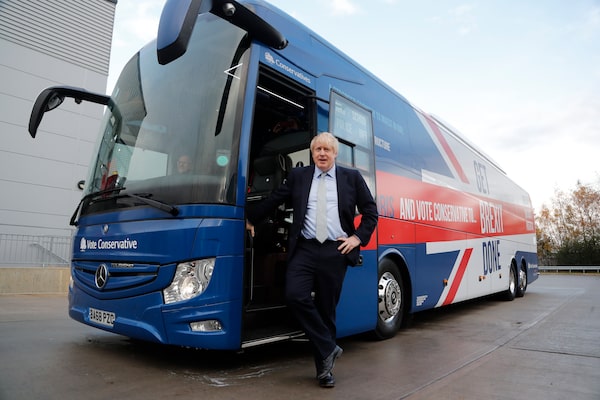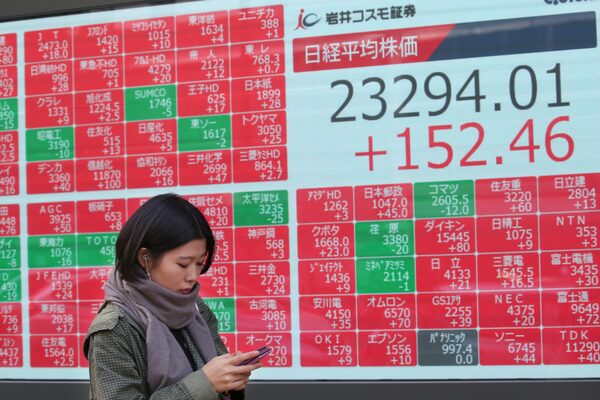NOT SO FAST
Smokes comes out of a factory chimney in Shanghai on Nov. 28.Nir Elias/Reuters
How big a risk is a global economic recession? Recently, hopes of a fledgling growth turnaround were doused by data showing China’s factory output growth slowing in October and Japan’s economy grinding to a standstill in the third quarter. And Germany only narrowly avoided a recession in that period.
Cue “flash” purchasing managers’ indexes (PMI) due on Nov. 22 from Japan and the euro area; numbers widely regarded as a forward-looking indicator of economic health.
October PMIs pointed to some stabilization, raising expectations that hefty central bank easing had helped the global economy to bottom out.
On the flip side, Sino-U.S. trade uncertainty drags on, making it harder to call a turnaround in the data. No wonder then, that after weeks of heavy selling, government bond yields are heading down again.
Yet, European Central Bank vice-president Luis de Guindos said on Thursday risks of a European recession were “very low.” The PMIs may bear that out – or not.
SPEND, SPEND, SPEND

Britain's Prime Minister Boris Johnson poses for a picture prior to boarding his General Election campaign trail bus in Manchester, England, Friday, Nov. 15.Frank Augstein/The Associated Press
Britain’s election is less than a month away and with the two main parties set to release their election manifestos, one thing is for sure: Both plan to spend big.
The opposition Labour Party pledged on Friday to nationalize BT Group PLC’s broadband network, proposing to fund that through extra tech sector taxes. It has already suggested nationalizing water and utility firms, an exercise that S&P Global estimates could cost £160-billion ($273.3-billion). The Conservatives, favourites to win, are also wooing voters, with the biggest public service spending increases in 15 years and plans to spend up to 3 per cent of annual output on infrastructure – almost double historical averages.
Under any election outcome, state spending looks set to rise to levels unseen since the 1970s, according to think tank Resolution Foundation. And there’s only one place the government can find the money – bond markets. British public debt stands around 80 per cent of GDP; below U.S. and Japanese levels, but higher spending plus the Brexit hit to growth mean that ratio can only rise.
Government 10-year borrowing costs have almost doubled since early September and could move higher, especially if Britain’s rating is cut. Moody’s recently cut the rating outlook, citing among other things, rising public debt.
RETAILERS: IT’S A WRAP

This June 25, 2019, file photo shows the entrance to a Walmart in Pittsburgh.The Associated Press
Walmart Inc. dodged the trade bullet on Thursday with an earnings beat showing its growing market share in groceries helped insulate it from tariffs on Chinese imports. Soon we’ll learn whether other retailers have been as well positioned to weather the trade dispute.
Home Depot Inc., Kohl’s Corp., Urban Outfitters Inc., Target Corp., Macy’s Inc. and Gap Inc. are among the chains reporting in what will be the end game for third-quarter earnings. Based on results from 458 S&P 500 companies that have reported, earnings are down 0.4 per cent from third-quarter 2018, Refinitiv data show.
The big stores, plus online behemoth Amazon.com Inc., are a key indicator of whether the U.S. consumer – representing more than 70 per cent of the economy – is still spending, even as manufacturing struggles and job growth plateaus. It’s particularly important heading into the make-or-break, year-end shopping stretch.
Amazon’s weak holiday-quarter guidance last month fed worries that the trade spat is hurting the U.S. retail industry.
Next Friday brings advance readings on November PMIs as well as the final University of Michigan consumer sentiment print. That should play into the outlook from retailers.
PAPER CUTS

A woman walks by an electronic stock board of a securities firm in Tokyo, Friday, Nov. 15.Koji Sasahara/The Associated Press
China isn’t in a great place right now.
With the economy slipping deeper in the trade war quagmire, the case for lowering the new lending reference rate, the LPR, is getting stronger. Industrial production growth has slowed below 5 per cent, steel output is at seven-month lows and third-quarter economic growth is at its slowest in a generation.
The central bank has fiddled monetary settings to get things moving, trimming the medium-term lending facility last week by five basis points (100 basis points equal one percentage point). The LPR was cut in August and September; glacial progress toward a trade truce makes another step down in interest rates likely.
Then there’s Hong Kong, racked by increasingly violent pro-democracy protests and in recession for the first time since 2009. E-commerce titan Alibaba Group Holding Ltd.’s US$13.4-billion initial public offering, set to take place in coming days, is seen as a vote of confidence.
But demand for the stock has started sucking out cash, raising short-term borrowing costs. These have already shot toward decade-highs marked in July and will rise further if capital starts fleeing. It’s not a situation China will be keen to deal with at this point.
PAIN IN SPAIN
Spain looks set for a coalition government comprising the Socialists and the far-left Unidas Podemos – a prospect that doesn’t sit well with markets given Podemos has called for a rise in public spending, taxing banks more and rethinking privatization plans for lender Bankia.
Given all this coincides with an economic slowdown, it’s no surprise that Madrid stocks plunged when the coalition pact was announced. The share index, the IBEX, has since fallen to the lowest level relative to the pan-European STOXX benchmark since the latter was created in 1998. The IBEX is up 7.6 per cent so far this year, while the STOXX has surged 20 per cent.
After four Spanish elections in as many years, one would expect investors to be inured to political uncertainty. Indeed bond yields, while at four-month highs, have reacted less than shares. But the equity sell-off shows sentiment remains fragile.
The Socialists/Podemos accord is not a done deal yet. The coalition would also rely on other parties for a parliament majority, potentially tempering big policy swings to the left. And investors also hope Nadia Calvino, the acting economy minister and respected economist, stays in the new government.